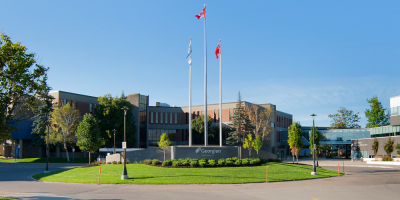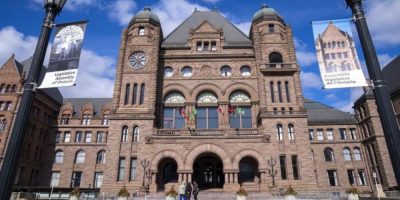
By Liam Casey
Ontario Premier Doug Ford pledged Friday to build more jails as data shows the inmate population surged over the last year to the point where the vast majority of correctional institutions are well over capacity.
Ford, speaking at an unrelated housing announcement in Milton, Ont., said he'd construct as many jails as needed in Ontario.
"I'm going to be building more jails and I'm not worried about the criminals," he said when asked about the overcrowded system.
"I'll build as many jails as we need to put these criminals behind bars for a long time."
Data obtained by The Canadian Press through freedom-of-information laws shows the majority of Ontario jails are over capacity. Meanwhile, the province has said 81 per cent of inmates in provincial jails are awaiting trial and presumptively innocent.
Criminal lawyers and correctional officers have said the jam-packed jails have deleterious effects on both inmates and jail guards.
The union representing correctional officers says inmates are triple bunking in several institutions, while guards are dealing with increased assaults and struggling with their mental health. The Criminal Lawyers Association says accused individuals are taking longer to get to a bail hearing, contributing to the rise in jail populations.
As of Sept. 30, 2023, there was an average of 8,889 people in provincial jails, well over the 7,848-person capacity, and about 1,000 more inside jails on average compared to the year before.
Maplehurst Correctional Complex, not far from where Ford's housing announcement took place Friday, is the province's most overcrowded jail, operating at 134 per cent capacity in 2023, average inmate data shows.
Provincial jails hold people accused of a crime but not out on bail, as well as those serving sentences of two years less a day. Inmates serving sentences of two years or longer spend their days in the federal prison system.
The province is already building a new 345-bed jail in Thunder Bay, Ont., that will replace the current jail and double its capacity. The government also plans to build a 235-bed jail in eastern Ontario, but that project has met opposition from locals who don't want to see it built on prime farmland.
The Ontario Public Service Employees Union, which represents provincial correctional officers, said guards are increasingly assaulted, and operational stress injuries and post-traumatic stress disorders are on the rise. Suicides among correctional officers are also increasing and officers are asking the province for more help, a union spokesman recently said.
Ford said he would always support correctional officers.
"I always have their backs," he said. "We'll sit down with the solicitor general and follow through with the commitment of making sure that there's more cells to keep these criminals in and supporting our correctional services officers."
On Jan. 31, Attorney General Doug Downey issued a directive to Crown attorneys to oppose more bail hearings for "serious violent crimes," including allegations of robberies with a gun, home invasions and car jackings.
Prosecutors must seek approval if they want to grant bail under "exceptional circumstances" and senior Crown attorneys must be notified if someone is granted bail that the prosecution fought.
The premier has ramped up his tough-on-crime messaging in recent weeks and has come under fire from the legal profession and the opposition after saying his government wanted "like-minded judges" to be tougher on accused criminals.
Downey recently appointed two former staffers to the committee that hires provincial judges and justices of the peace, who largely deal with bail hearings. News of the appointments sparked an uproar from the legal community and opposition politicians.
The Criminal Lawyers Association said Ford's pledge to build more jails is nothing more than "political rhetoric."
"If and when the premier wants to engage in a serious discussion about finding ongoing solutions to continue to improve Ontario’s criminal justice system and the public’s perception of it, the Criminal Lawyers Association remains committed to participating and doing its part to assist," said Boris Bytensky, the association's president.
Bytensky said the province should replace "old, often unsuitable and desperately over-populated" jails.
New Democrat Leader Marit Stiles said the government has to address the overburdened court system and jammed-up jails.
"I want the government to start to properly fund our court system so that we can actually move cases through at a better rate, so people get justice," she said. "Also, we need to really address what's happening in our correctional system, and we're underfunding it, clearly."
Ontario Liberal parliamentary leader John Fraser said overcrowded jails are not safe for inmates or correctional workers.
"The premier talks tough on crime but doesn't put his money where his mouth is in terms of giving resources to corrections and resources to the courts," he said.
University of Ottawa criminology professor Justin Piché said Ontario should use money earmarked for new and expanding jails on other areas of need that he said would yield better outcomes.
"He could also make a huge dent in our prison population by investing more in permanent and supportive housing at an annual cost of $40,000 per person, as well as intensive mental health, harm reduction and drug treatment supports," Piche said.
This report by The Canadian Press was first published March 8, 2024.





